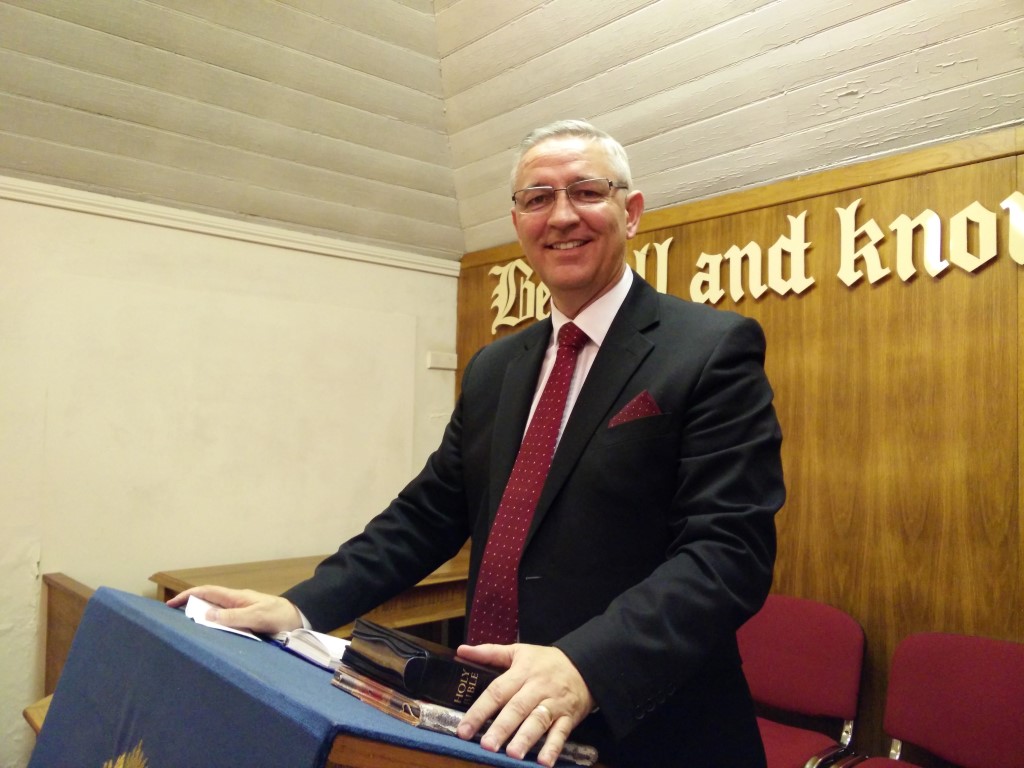Date: SUN 7:00pm 28th September 2025
Preacher: Rev. David McLaughlin
Bible Reference: Isaiah 38:17
Behold, for peace I had great bitterness:
but thou hast in love to my soul delivered it from the pit of corruption:
for thou hast cast all my sins behind thy back.
Sermon Summary: Isaiah 38:17 – The Greatest Burden Behind God’s Back
Scripture Reading: Isaiah 38:1-17
The sermon, delivered with a focus on Isaiah 38:17, draws from the personal testimony of King Hezekiah, who faced severe trials yet experienced God’s saving grace. The preacher encourages the congregation to read the entire chapter at home, emphasizing its relevance for those facing sickness or spiritual turmoil. The key verse, Isaiah 38:17, reads: “Behold, for peace I had great bitterness: but thou hast in love to my soul delivered it from the pit of corruption: for thou hast cast all my sins behind thy back.” The sermon’s title, “The Greatest Burden Behind God’s Back,” highlights the transformative power of God’s forgiveness and salvation.
Context of Hezekiah’s Testimony
King Hezekiah, a godly ruler of Judah, faced two significant crises:
- The Siege of Jerusalem: The Assyrian army, having conquered surrounding regions, besieged Jerusalem, threatening its destruction. Hezekiah feared the city’s fall and the slaughter of its people. However, divine intervention occurred, as recorded in Isaiah 37:36, where the angel of the Lord struck down 185,000 Assyrians overnight, sparing the city.
- Terminal Illness: In Isaiah 38:1, Hezekiah, aged 39, was struck with a life-threatening illness. The prophet Isaiah delivered God’s message: “Set thy house in order: for thou shalt die, and not live.” Devastated, Hezekiah prayed earnestly, reminding God of his faithful walk (verse 3). God mercifully extended his life by 15 years and provided a miraculous sign by turning the sun’s shadow back ten degrees (verse 8). Additionally, Hezekiah later received a son, securing the royal line of Judah, which was critical for the promised Messiah.
Hezekiah’s written testimony (verses 9-22) reflects his emotional and spiritual journey through sickness, fear, and divine deliverance. The preacher underscores its relevance for anyone facing terminal illness or spiritual despair, offering insight into God’s dealings with His people.
Key Themes and Lessons
The sermon is structured around four main points drawn from Isaiah 38:17, each exploring the spiritual implications of Hezekiah’s experience:
1. The Confession That Was Welcomed
- Hezekiah’s testimony begins with a deep sorrow for sin, expressed as “great bitterness” (verse 17). This bitterness stemmed from his terminal illness, the siege of Jerusalem, and his lack of an heir, which threatened the Messianic line. His distress was not merely physical but spiritual, as he recognized his sins before God.
- The preacher emphasizes the importance of a sense of sin. Hezekiah acknowledged “all my sins” (plural), reflecting on sins from childhood to adulthood committed in thought, word, and deed. This ownership of sin is critical, as many today focus on others’ faults while ignoring their own (Romans 3:23 – “For all have sinned, and come short of the glory of God”).
- Sin is defined as any transgression of God’s law or lack of conformity to it. Hezekiah’s confession was not vague but specific, aligning with Psalm 51:4, where David confesses sinning against God alone. The preacher warns that unconfessed sin remains before God’s face, recorded and remembered (Hosea 7:2; Psalm 90:8), whereas Hezekiah’s sins were cast behind God’s back, signifying forgiveness and removal.
2. The Corruption That Is Waiting
- Hezekiah speaks of being delivered from “the pit of corruption” (verse 17), a metaphor for hell, where the unrepentant are destined (Psalm 9:17 – “The wicked shall be turned into hell, and all the nations that forget God”). The preacher describes humanity’s natural state as a “mass of corruption” due to the fall in Eden, with hearts that are disobedient, minds darkened, wills depraved, and affections diseased.
- Without salvation, individuals remain under sin’s penalty, power, and pleasure, heading toward eternal destruction (Revelation 21:8). Hezekiah’s deliverance from this pit reflects God’s grace in rescuing him from both physical death and spiritual condemnation.
3. The Conversion That Is Wonderful
- Hezekiah’s salvation was not earned by his goodness as a king but was rooted in God’s love: “Thou hast in love to my soul delivered it.” The preacher highlights God’s eternal, free, and sacrificial love, most clearly revealed in Christ’s death on the cross (John 3:16; Romans 5:8). This love prompted God to hear Hezekiah’s cry and declare, “The Lord was ready to save me” (Isaiah 38:20).
- True conversion involves recognizing one’s sinfulness, confessing it, and trusting in Christ’s redemptive work. Hezekiah’s experience exemplifies this transformative process, moving from despair to deliverance through God’s grace.
4. The Certainty That Is Workable
- The phrase “Thou hast cast all my sins behind thy back” signifies the complete removal of sin from God’s sight, made possible through Christ’s atoning work in the covenant of grace. The preacher explains that in this covenant, God the Father commissioned the Son to live a sinless life, fulfill the law, and die a substitutionary death, securing forgiveness for believers (Hebrews 10:12).
- This forgiveness is permanent, as God promises, “Their sins and iniquities will I remember no more” (Hebrews 10:17). Believers are justified, freed from sin’s penalty, and transformed into new creatures with a love for righteousness (2 Corinthians 5:17). The preacher encourages the congregation to seek this certainty by placing faith in Christ, assuring them of a “full and free and forever pardon.”
Application and Call to Action
The sermon concludes with a passionate appeal to the congregation, both in-person and online, to reflect on their spiritual state. The preacher urges those who are unsaved to confess their sins, recognize their corrupt nature, and seek God’s salvation through Christ. He emphasizes the joy of sins forgiven and the assurance of eternal life, contrasting the fate of unrepentant sinners (before God’s face) with the redeemed (sins behind God’s back).
For those facing sickness or trials, Hezekiah’s testimony offers hope, demonstrating God’s readiness to save and deliver. The preacher invites anyone needing spiritual guidance to come to faith in Christ, promising the joy of forgiveness and a transformed life.
Key Takeaways
- Hezekiah’s Testimony: A real, lived experience of God’s grace amidst trials, offering hope to those in despair.
- Sin’s Seriousness: Unconfessed sin remains before God, but through Christ, it can be cast behind His back.
- God’s Love and Salvation: Rooted in God’s eternal love, salvation is freely offered to those who confess and believe.
- Certainty of Forgiveness: Christ’s sacrifice ensures a permanent pardon, transforming believers into new creatures.
The sermon closes with a prayer for God’s blessing on all who hear or read the message, encouraging them to trust in Christ and experience the joy of sins forgiven.
Subscribe to the podcast here:
Spotify Podcasts | Apple Podcasts | Pocket Casts
Email | RSS | more information here







